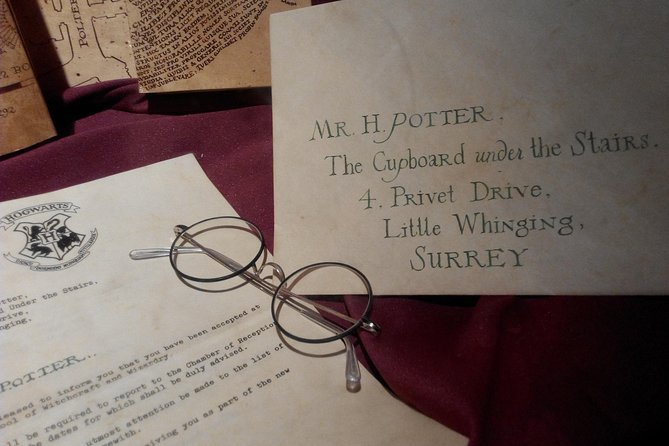The Harry Potter series offers a wealth of insights for fantasy writers seeking to craft captivating stories. From the richly-detailed wizarding world of Hogwarts to the intricate character development, Rowling’s work serves as a masterclass in worldbuilding and narrative structure. Aspiring authors can glean valuable lessons on creating immersive magic systems, incorporating relatable themes, and weaving mythological references into their plots. While the series’ popularity is undeniable, its true significance lies in the invaluable guidance it provides for writers aiming to build their own enchanting realms.
Key Points

-
The Harry Potter series showcases effective worldbuilding techniques, including blending fantastical and realistic elements to create a highly immersive magical universe.
-
The series features a diverse range of well-developed character archetypes, providing inspiration for crafting memorable protagonists, sidekicks, mentors, and antagonists in fantasy narratives.
-
The meticulously designed magic system in Harry Potter, with its unique spells, incantations, and magical cores, offers a template for developing captivating magical frameworks in fantasy writing.
-
The series explores rich thematic elements, such as prejudice, morality, and the battle between good and evil, which can inspire fantasy writers to integrate thematic depth into their own stories.
-
The narrative structure, dialogue, characterization, and descriptive techniques employed in the Harry Potter series provide valuable lessons for fantasy writers in crafting engaging, immersive, and well-paced storytelling.
Worldbuilding Insights From Hogwarts

One of the most remarkable aspects of the Harry Potter series is its rich and immersive worldbuilding. J.K. Rowling masterfully crafts the wizarding world, blending fantastical elements with realistic details.
From the magical school of Hogwarts to the hidden corners of Diagon Alley, the author creates a seamless and believable universe that captivates readers. Her attention to world-specific customs, hierarchies, and institutions provides valuable lessons for fantasy writers.
Rowling’s ability to weave intricate backstories and integrate them into the narrative offers a blueprint for building authentic, multilayered worlds. Aspiring authors can glean insights from Hogwarts’ architecture, magical systems, and diverse cast of characters to strengthen their own worldbuilding prowess.
You can also read our reviews of more tours and experiences in London.
Character Archetypes and Tropes

Beyond the rich worldbuilding of the Potterverse, J.K. Rowling’s characters embody classic fantasy archetypes and tropes.
Harry, the chosen orphan hero, follows the monomyth narrative. Hermione, the brilliant yet underappreciated witch, represents the brainy sidekick. Ron, the loyal best friend, fulfills the role of the comic relief. Dumbledore, the wise wizard mentor, guides the protagonists. Voldemort, the dark lord villain, embodies pure evil.
These archetypes resonate with readers, providing familiarity and emotional investment. Fantasy writers can learn from Rowling’s masterful blending of archetypal characters with unique personalities.
Crafting recognizable yet distinct character types allows authors to build engaging stories that feel both fresh and comfortingly familiar.
Magic Systems and Spellcraft
The Harry Potter series showcases a meticulously crafted magic system, allowing readers to enjoy the spellcasting rituals and enchantments of the Wizarding World.
The magic in this fantasy universe is diverse, versatile, and governed by strict rules, including:
- The use of wands, which act as conduits for magical energy and allow witches and wizards to channel their innate abilities.
- Incantations, or the spoken words that activate spells, which vary in length and complexity.
- The concept of magical cores, which determine the strength and aptitude of individual wizards and witches.
This intricate magic system not only adds depth and authenticity to the story but also provides inspiration for fantasy writers seeking to develop their own unique magical frameworks.
Themes and Symbolism
Along With its meticulously crafted magic system, the Harry Potter series explores a rich tapestry of themes and symbolic elements that have captivated readers worldwide.
Throughout the seven novels, J.K. Rowling masterfully weaves themes of prejudice, morality, love, and the nature of good and evil.
Symbolic elements like the Deathly Hallows, Platform 9¾, and the Sorting Hat offer profound insights into the human condition.
These themes and symbols resonate deeply, fostering discussions on complex philosophical and social issues.
For fantasy writers, the Harry Potter series serves as a powerful example of how to seamlessly integrate thematic depth and symbolic richness into a captivating magical world.
Mythological Influences and References
How does the Harry Potter series draw upon a rich tapestry of mythological influences and references? J.K. Rowling’s magical world is interwoven with a multitude of mythological elements, captivating readers and writers alike.
Among the key influences:
-
The concept of wizarding schools, such as Hogwarts, echoes ancient traditions of esoteric knowledge and mystical training.
-
Mythical beasts, like the phoenix and the basilisk, add layers of symbolic depth to the narrative.
-
Archetypal characters, such as the wise mentor and the chosen hero, resonate with timeless mythological archetypes.
These mythological underpinnings imbue the Harry Potter series with a sense of timelessness and universal appeal, providing a wellspring of inspiration for fantasy writers.
Narrative Structure and Pacing

Rowling’s mastery of narrative structure and pacing captivates readers, propelling them through the Harry Potter series with unwavering momentum. Each book follows a classic three-act structure, with rising action, a climactic battle, and a satisfying resolution. Rowling’s pacing is equally masterful, building tension and suspense through strategic reveals, cliffhangers, and well-timed plot twists. This culminates in a page-turning reading experience that keeps audiences eagerly anticipating the next installment.
| Narrative Structure | Pacing |
|---|---|
| Three-Act Structure | Tension and Suspense |
| Rising Action | Reveals and Cliffhangers |
| Climactic Battle | Plot Twists |
| Resolution | Page-Turning Momentum |
| Classic Storytelling | Captivating Readers |
Dialogue and Characterization Techniques

What makes Rowling’s dialogue and character development so compelling? One key factor is her ability to craft distinct voices for each character. Rowling’s dialogue isn’t just functional – it reveals distinct personality traits, quirks, and motivations.
Her characters come alive through:
- Unique speech patterns and vocabulary that reflect their backgrounds and identities
- Subtext that conveys hidden emotions, motivations, and power dynamics
- Snappy exchanges that maintain a brisk pace and heighten dramatic tension
Plus, Rowling excels at character arcs, allowing her protagonists to evolve organically over the course of the series.
This depth of characterization is a hallmark of Rowling’s storytelling prowess and a valuable lesson for fantasy writers.
Lessons in Description and Sensory Details

The Harry Potter series is renowned for its immersive worldbuilding, and a key aspect of this is Rowling’s masterful use of description and sensory details.
Throughout the novels, readers are transported to the magical realms of Hogwarts and the wizarding world through the vivid depiction of sights, sounds, smells, and textures.
From the towering spires of the castle to the vibrant colors of Diagon Alley, every environment is brought to life in striking detail.
This attention to sensory experience not only enhances the reader’s imagination but also helps to establish a strong sense of place, making the fantastical setting feel tangible and real.
For fantasy writers, the Harry Potter series offers a masterclass in the power of descriptive storytelling.
Frequently Asked Questions
How Much Does the Harry Potter Walking Tour in London Cost?
The Harry Potter walking tour in London costs $335.17 and up, depending on the group size. Lowest Price Guarantee is available, and free cancellation can be made up to 24 hours before the tour starts.
What Is the Maximum Group Size for the Harry Potter Tour?
The maximum group size for the Harry Potter walking tour in London is 30 travelers. The tour is operated by Pigeon Tours and provides a professional guide to lead the group.
Is the Harry Potter Tour Wheelchair Accessible?
The Harry Potter tour in London is not wheelchair accessible. The tour requires a moderate level of physical fitness, and the meeting and end points are not located near wheelchair-friendly transportation options.
Can I Cancel My Harry Potter Tour Reservation for Free?
You can cancel your Harry Potter tour reservation for free up to 24 hours before the experience starts. The tour provider offers a free cancellation policy, allowing you to easily change your plans if needed.
What Are the Overall Ratings and Reviews for the Harry Potter Tour?
The Harry Potter tour has overwhelmingly positive reviews, with a 5-star rating across 4 reviews. Customers praise the knowledgeable guide and highly recommend the tour, indicating it’s an engaging experience for Harry Potter fans.
Recap
The Harry Potter series offers a treasure trove of insights for fantasy writers seeking to craft engaging, immersive stories. From meticulous worldbuilding to compelling character development, the series demonstrates the art of weaving complex narratives that resonate with readers. Aspiring authors can learn invaluable lessons in magic system design, thematic exploration, and masterful storytelling techniques, making the wizarding world a must-study for any fantasy enthusiast.
More Tour Reviews in London
- London to Southampton Cruise Port Including Stonehenge
- Great Artists : Impressionists, Monet & Private Art Studios
- The Sweet Spots of Covent Garden
- Luxury Private Day Hire London-London Stopover at Windsor & Hampton Court Palace
- E-Scavenger Hunt London: Explore the City at Your Own Pace
- London Westminster With Big Ben Private Professional Photo Shoot 60MIN
Not for you? Here's more things to do in London we have recnetly reviewed
- 2 Best Craft Beer Tours And Tastings In London
- 8 Best 3 Day Tours In London
- 25 Best Cruises And Boat Tours In London
- 20 Best Christmas Experiences In London
- 25 Best Dining Experiences In London
- 20 Best Full-Day Tours In London
- 2 Best 2 Day Tours In London
- 2 Best Pasta Experiences In London
- 4 Best Private Car With Driver Services In Brighton
- 2 Best Private Car With Driver Services In Crawley
- 3 Best Private Car With Driver Services In Epsom
- 3 Best Private Car With Driver Services In Guildford
